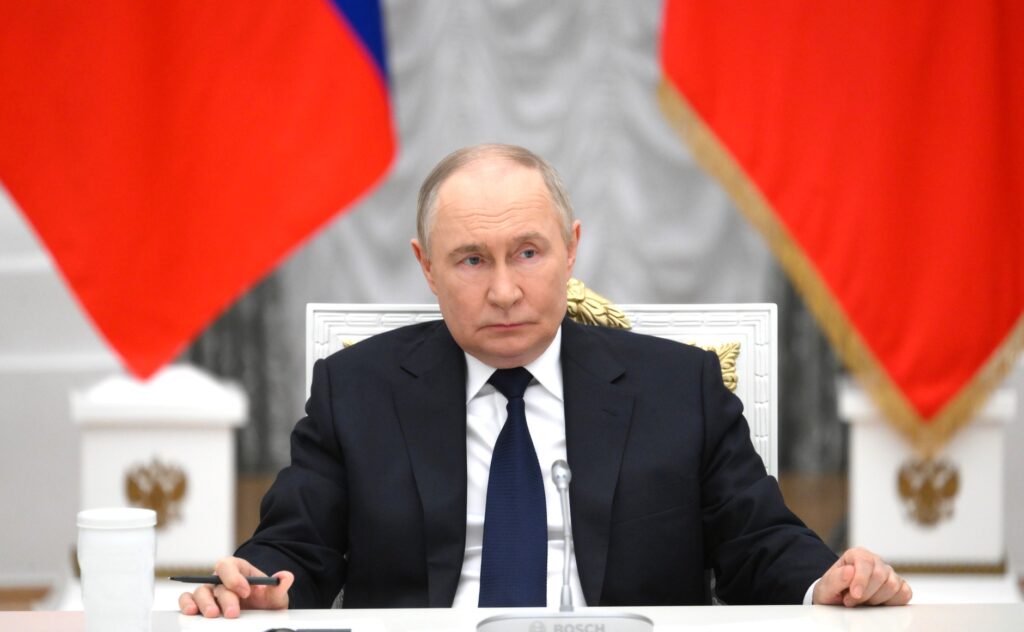MOSCOW (Realist English). President Vladimir Putin marked Russia’s Entrepreneurs’ Day with a forceful message to the country’s business and government leaders: support exporters at all costs, push through bureaucratic obstacles abroad, and defend domestic manufacturers with tougher oversight at home.
Speaking at a Kremlin meeting with executives from companies involved in import substitution, industrial innovation, and foreign trade, Putin stressed that Russia’s 4.3% GDP growth in 2024 was not the result of “a few titans” but rather the work of “thousands of companies across the country.”
“The success of our country,” he said, “depends on the daily, intensive work of our entrepreneurs. From Siberia to Novorossiya, from the first railways to today’s export markets — it is business that moves the nation forward.”
Exporters face foreign barriers and “corrupt practices”
Putin gave particular attention to medical equipment exports, following remarks from Irina Malamant, head of Neurosoft, a company based in Ivanovo that sells to over 100 countries. Malamant highlighted how the revocation of EU certifications in 2022 restricted access to new markets and called for faster mutual recognition of Russian licenses in friendly countries.
In response, Putin pledged systemic support and used blunt language to convey urgency:
“The state must hammer, hammer, hammer until the result is there.”
He ordered the Foreign Ministry and Ministry of Industry and Trade to step up efforts through trade missions, and noted that in many cases, Russian exporters are blocked not by market logic but by entrenched corruption abroad:
“Favored companies shut out new players. But if we work systematically, we can break through.”
Steel producers push for tax relief
Executives from the metallurgy sector pressed the president for excise tax relief on high-alloy steel production. Konstantin Zhukov, head of Metall Service, proposed a tax holiday for new facilities. Finance Minister Anton Siluanov replied that the current tax is flexible and wasn’t collected in April due to low market prices.
But producers of “green steel” like Ivan Demchenko (Novostal-M) warned of dangerously low margins and the risk of production shutdowns. Putin acknowledged the concern and directed the Finance Ministry and Ministry of Economic Development to “carefully examine the specifics of electrometallurgy.”
Tightening control on state procurement and import substitution
Import substitution in government contracts also came under scrutiny. Andrei Kanunnikov, director of the Kursk Electrical Equipment Plant, reported that many public sector buyers are circumventing localization rules, substituting domestic components with foreign ones.
Putin called for enforcement:
“If the legal framework exists but is ignored, then we need a mechanism of enforcement.”
Industry Minister Denis Manturov proposed financial penalties, while Siluanov advocated for stronger oversight via the public procurement system. Putin instructed ministers to act and warned:
“If it doesn’t work — we’ll impose sanctions. But first, issue warnings.”
Support for composite materials — previously imported from Germany and Italy — was also discussed as part of broader efforts to localize strategic industries.
Strategic messaging: support, not slogans
The meeting underscored a key shift in the Kremlin’s business agenda: support is no longer limited to tax breaks or grants. It now includes political backing abroad, pressure on regulators, and coordinated lobbying across ministries.
Putin made clear that only businesses that create technology, grow regions, and export at scale can count on this level of engagement.
The Kremlin is shaping a new social contract with business — not just as taxpayers, but as pillars of Russia’s industrial strategy. The push for “technological sovereignty” demands more than patriotic slogans: it requires export infrastructure, skilled labor, and market access. In this environment, the bureaucrat is no longer a manager — but a frontline operator, expected to act decisively, even aggressively. As Putin put it: “Hammer, hammer, hammer.”
